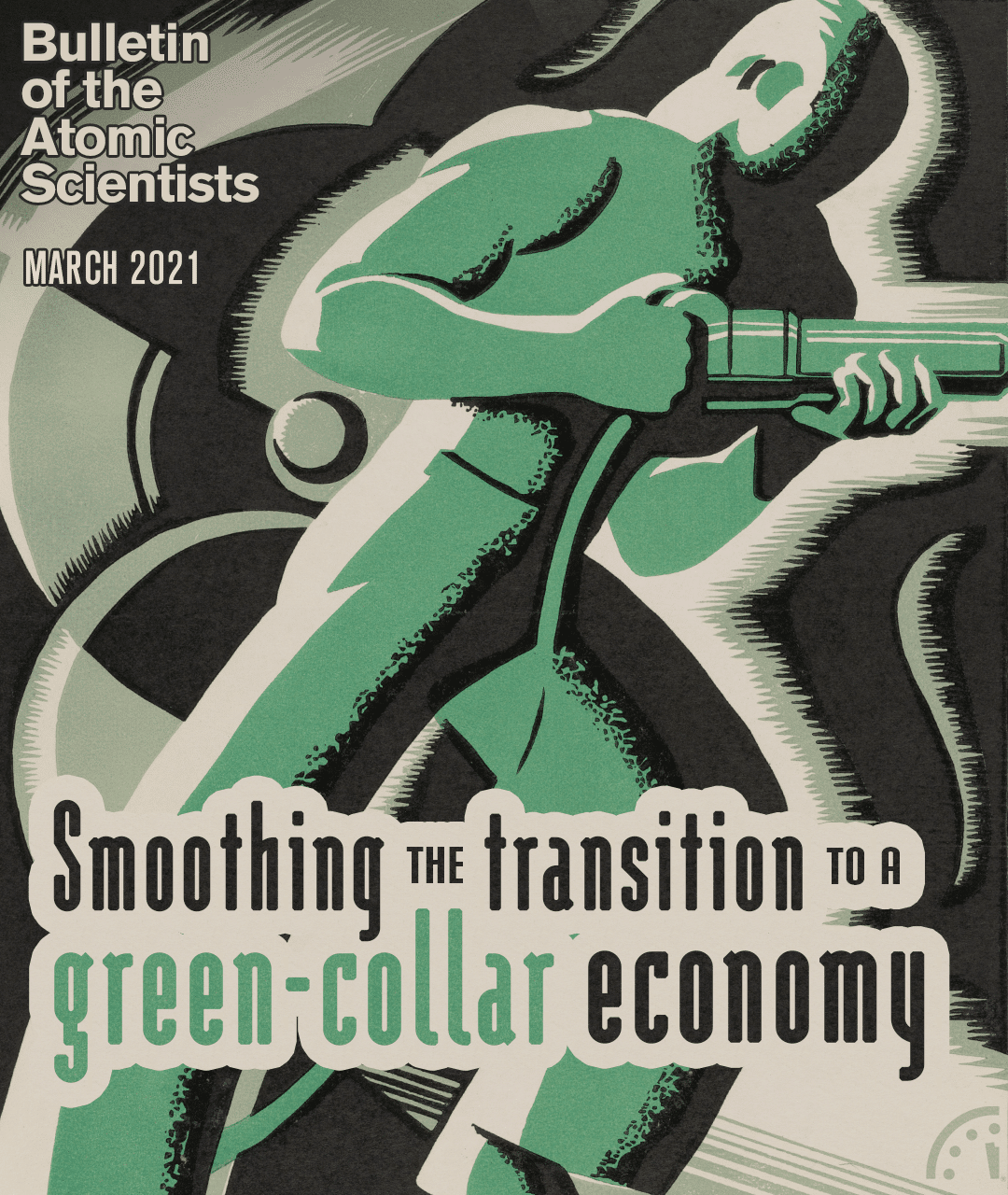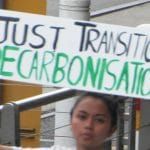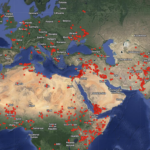Making the transition to a green economy: What is our responsibility as citizens?
By Adam Sobel | March 15, 2021
Making the transition to a green economy: What is our responsibility as citizens?
By Adam Sobel | March 15, 2021
What moral responsibility does each of us carry as an individual to fight global warming, and what is the best way for us to fulfill that responsibility? What actions are most likely to be effective?
Any attempt to answer these questions has to address the relative importance of individual versus collective action. Is it more important to reduce one’s own carbon footprint, or to work for structural change?
They aren’t mutually exclusive; we can do both (Brownstein, Madva and Kelly). But it’s still useful to consider some of the arguments, moral and pragmatic, for each side.
I am mostly with the structuralists. Pragmatically, the scale of the decarbonization problem is so enormous that the actions of individuals won’t solve it. We need to remake the systems that produce and use energy at a scale and to an extent that only governments and large corporations have the power to do (as can be heard in the podcast “Give Up Your Climate Guilt”).
On the other hand, though, those of us who are the most affluent and who are responsible for the highest emissions—this includes me, and if you’re reading this, probably you, too—have benefited the most from the economic, political, and technological systems that have created the problem, while the worst harms are being felt by those with the least responsibility (Garthwaite 2019). So we should do what we can, as individuals, to make it better. Fly less, take public transit, drive a hybrid or electric car if you do need to drive, eat less meat, and so on. (And learn which choices are not effective—most carbon offset programs, for example, are not [Martinho 2019].)
But pragmatically, people don’t like personal sacrifices. No matter what we do, not enough people will make enough sacrifices to solve the problem. And asking people to sacrifice will turn many off, blunting the political will that is needed to achieve systemic change.
And the moral argument for individual action also has a moral counter-argument. We make our individual choices within a system that we didn’t design or choose. We could live about as comfortably as we do, while burning much less carbon, if the real public, “external” cost of emissions had been charged to those profiting from them—be it a carbon tax, cap and trade, regulation, or any other system (Pierrehumbert 2016). This would have given the private sector a powerful incentive to come up with lower-carbon ways to provide the goods and services we enjoy. Instead, fossil fuel companies and their allies have sponsored misinformation and denial to prevent any such system from coming into existence. They have wielded their great economic and political power to maximize their profits at everyone else’s expense, and this makes them the most culpable for the problem. To focus on our individual carbon footprints lets them off the hook—just like drug dealers deserve more blame than addicts do.
On the other hand again, the fact that I didn’t create or choose the energy systems I use every day doesn’t absolve me of all responsibility. Neither I nor my ancestors participated directly in slavery, colonialism, or the genocides of indigenous peoples, but all those things contributed to the present wealth and power of the United States, so I indirectly benefit from them. That imposes a responsibility on me to understand and do what I reasonably can to remedy the present inequities that those histories have produced. Global warming is no different from those other enormous historical injustices—and in fact is directly related to them (Heglar 2019).
Whether we act individually or collectively, though, the central goal should be to change the behavior of the fossil fuel companies. If they would stop supporting denial, stop advocating for deregulation and the building of new harmful infrastructure, and earnestly work to transform themselves to clean energy companies as quickly as possible, that would enable quantum leaps forward in mitigating global warming.
The best of the fossil fuel companies are, in fact, starting to say many of the right things. With those companies, it’s a question of holding them to their pledges, convincing them to move further and faster, and prioritizing steps that lead to actual emissions reductions, as opposed to ineffective offsets. The worst of the fossil fuel companies are still … the worst. Those need yet stronger incentives. To give them those incentives, it seems to me that we need to pull all the levers.
The first of these levers is government. A US federal government that has the will and power to act on climate can do a great deal. After four deeply benighted years of Trumpism, we might finally have that. President-elect Biden has a team and a platform on climate that are far stronger than anything seen before in US politics—in no small part due to the efforts of the youth climate movement. And after the Georgia elections, the new Democratic Senate will make things possible that wouldn’t have been otherwise. The filibuster will still make legislation difficult, but the picture looks a lot brighter than it did just a relatively short time ago. And beyond any specific actions that the new administration may take, we can hope that this regime change helps convince recalcitrant fossil fuel companies that decarbonization is inevitable, and it’s better to be on the right side of history.
And there are other levers of power. Divestment on the part of large institutional investors contributed to ending apartheid in South Africa; now a similar movement, aimed at the fossil fuel industry, is gaining momentum, and has real potential to hasten the end of the fossil fuel era. My own institution, Columbia University, divested in 2017 from companies that derive more than 35 percent of their revenue from thermal coal production. I’m thrilled that, as this piece went to press, our president announced that the university is now and will remain divested from all fossil fuel companies, or at least all that aren’t working conscientiously towards a transition to clean energy. Here again, young people have led the way; our students have been the strongest advocates for this action (Escobar 2020).
And individual actions do matter, because they can change the culture. Cultural change can lead to political change. Gay marriage seemed politically impossible until it didn’t. The more of us that make what lower-carbon choices we can, and talk about how we are doing it—without shaming others or expecting sacrifices that would cause hardship—the closer the equivalent moment for real climate action will come. I’m no hero here, but I’ve switched to driving a hybrid, eat mostly vegetarian, and am resolved to fly less (even once the pandemic ends).
So, keep voting, and keep up the pressure on elected officials to act on climate. But the scale of the climate problem, and our responsibility as beneficiaries of the systems that have caused it, also justify acting on our own, in all the ways that we can.
References
Brownstein, M., Madva, A., and Kelly, D. “Individualism, Structuralism, and Climate Change.” Static 1 Squarespace. No date. https://static1.squarespace.com/static/5210d4dce4b0348bfd1debf8/t/60020fcbb89dd90426eb2ed4/1610747852565/Climate+Change%2C+Individualism%2C+and+Structuralism.pdf
Escobar, V. 2020. “Columbia divested from thermal coal companies, but students call for stronger stance.” Columbia Daily Spectator, February 14. https://www.columbiaspectator.com/news/2020/02/14/columbia-divested-from-thermal-coal-companies-but-students-call-for-greater-fossil-fuel-divestment/
Garthwaite, J. 2019. “Climate change has worsened global economic inequality.” Stanford University Earth Matters Magazine. Stanford University, School of Earth, Energy & Environmental Sciences. https://earth.stanford.edu/news/climate-change-has-worsened-global-economic-inequality#gs.r44v5f
Heglar, M. 2019. “Climate change isn’t racist—People are.” Medium, August 13. https://zora.medium.com/climate-change-isnt-racist-people-are-c586b9380965
Martinho, F. 2019. “An even more inconvenient truth.” ProPublica. May 22. https://features.propublica.org/brazil-carbon-offsets/inconvenient-truth-carbon-credits-dont-work-deforestation-redd-acre-cambodia/
Pierrehumbert, R. 2016 “How to decarbonize? Look to Sweden.” Bulletin of the Atomic Scientists. March 2. https://www.tandfonline.com/doi/full/10.1080/00963402.2016.1145908
Stover, D. 2019. “SUV shaming: I care about climate change, so why am I driving an SUV?” Bulletin of the Atomic Scientists, November 18. https://thebulletin.org/2019/11/i-care-about-climate-change-so-why-am-i-driving-an-suv/
Together, we make the world safer.
The Bulletin elevates expert voices above the noise. But as an independent nonprofit organization, our operations depend on the support of readers like you. Help us continue to deliver quality journalism that holds leaders accountable. Your support of our work at any level is important. In return, we promise our coverage will be understandable, influential, vigilant, solution-oriented, and fair-minded. Together we can make a difference.
Keywords: carbon footprint, climate change, climate crisis, decarbonize, divestment, global warming, green economy
Topics: Climate Change





















